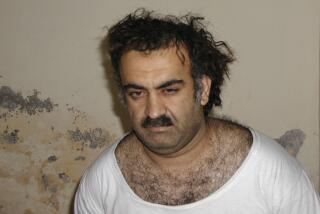U.S. Fights Bid by Moussaoui to Meet Suspects
- Share via
WASHINGTON — Zacarias Moussaoui, considered a “late insertion” into the Sept. 11 plot, should be barred from meeting with other terrorism suspects before his trial because it would severely jeopardize ongoing intelligence-gathering operations, according to government documents released Wednesday.
The documents, filed secretly last month with the U.S. 4th Circuit Court of Appeals and partially disclosed Wednesday, also show that the government is worried that having other alleged terrorists testify in Moussaoui’s defense would make a mockery of the court system and allow Al Qaeda operatives to send coded messages to one another around the globe.
“The nation is currently engaged in an armed conflict with an enemy force that has already killed more than 3,000,” prosecutors told the court.
“The interest at stake in this case involves paramount concerns of protecting national security by preserving the government’s ability to gather intelligence vital to saving American lives and winning an ongoing war.”
In the March 14 appellate court brief, the government signaled that it had strong evidence linking Moussaoui with the 19 men who commandeered four commercial airplanes and crashed them in New York, Virginia and Pennsylvania.
Moussaoui, the government said, “was preparing to participate in the attacks of Sept. 11, 2001. As part of his preparation, defendant received single engine and commercial aviation simulator training, obtained some of the same types of tools used to carry out the hijackings, and received money from other Al Qaeda operatives who were part of the plot.”
Prosecutors also made this assertion, without adding any detail: “There is abundant evidence that establishes defendant’s late insertion into the plot. Likewise, there is sufficient evidence regarding the roles of other individuals.”
Prosecutors cited “documentary evidence, including telephone and financial records,” that they said “abundantly establish” this assertion.
Moussaoui is awaiting trial in federal court in Alexandria, Va. But his case repeatedly has been put on hold because of his contentious disregard for the U.S. legal system and his insistence that he be allowed help in his defense from several alleged terrorists in U.S. custody.
Moussaoui wants the other captives to testify that he was not a part of the Al Qaeda plan to attack the World Trade Center and the Pentagon.
In Alexandria, U.S. District Judge Leonie M. Brinkema earlier sided with the defendant and asked both sides to work out an arrangement in which he could question the captives by closed-circuit television or some other means in preparation for his trial.
But the government immediately appealed to the 4th Circuit in Richmond, Va. The appellate court has asked the two sides to try to compromise; if that fails, the government could end up shifting Moussaoui to a military tribunal to avoid having to bring in the other captives as defense witnesses.
Indeed, prosecutors insist that allowing other captives to take the witness stand would endanger the ongoing intelligence-gathering process and could end up allowing Al Qaeda leaders to use their testimony to send coded signals to their followers.
“United States and allied forces have captured or taken control of thousands of enemy combatants,” prosecutors said.
The military has focused on dismantling Osama bin Laden’s terrorist network; it also wants to learn more by “identifying where its operatives are, how it plans attacks, who directs operations, and how they communicate.”
But turning their leaders into influential defense witnesses for Moussaoui or other defendants in the future would “hobble” ongoing interrogation efforts and ultimately could disrupt court trials.
“As more and more high-level leaders of Al Qaeda are detained by our forces,” government lawyers said, it “will undoubtedly become terrorist defendants’ favorite trump card, for they will guarantee either the end of a prosecution or the hobbling of interrogation efforts directed at Al Qaeda leaders overseas.”
Prosecutors added that the captives would take the stand and “eagerly exploit that opportunity to thwart our government’s efforts at gathering critical intelligence.”
“Moreover,” they said, “once Al Qaeda detainees realize that any false exculpatory statements [that would exonerate Moussaoui and others] could result in the dismissal of prosecutions against their comrades, the abuse would only multiply.”
More to Read
Sign up for Essential California
The most important California stories and recommendations in your inbox every morning.
You may occasionally receive promotional content from the Los Angeles Times.











